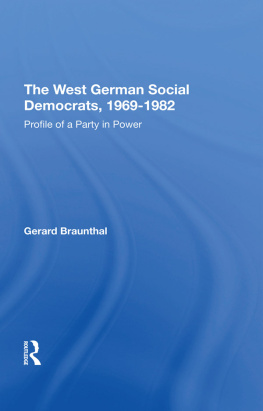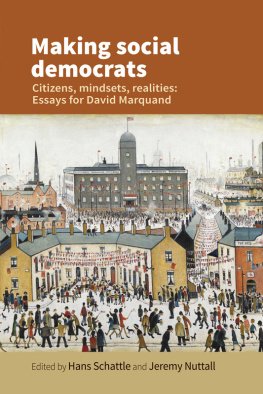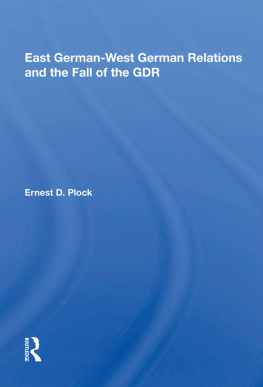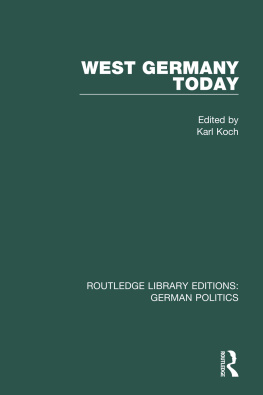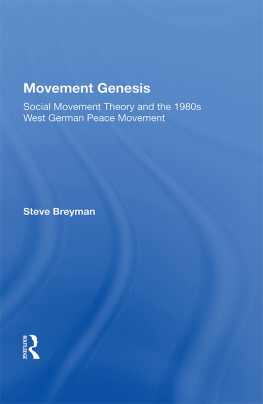The West German Social Democrats, 19691982
About the Book and Author
The West German Social Democrats, 19691982: Profile of a Party in Power
Gerard Braunthal
The fall of the West German government in 1982 ended the 13-year rule of the Social Democratic Party (SPD) as the senior coalition partner under Chancellors Willy Brandt and Helmut Schmidt. In perpetual opposition from 1949 to 1966, the Social Democrats finally entered the government as the junior coalition party in 1966; three years later they assumed primary responsibility for guiding the nation.
The central theme of this detailed examination of the SPD during its years of governance is that social and economic forces in the nation had a major effect, often unsettling, on the party at a time when it had achieved the pinnacle of political power. Significant changes in the partys organization, membership, leadership, factionalism, ideology, and voter support limited its role within the political system (in the executive and legislative branches) and its influence on domestic and foreign policies. Yet, its ability to remain in power for a comparatively long period attests to its strength and respectability among the voting public.
Dr. Braunthal draws on a wealth of documentation, some unpublished, located primarily in German archives and libraries. In addition, he interviewed more than 120 persons, ranging from the top SPD leaders to staff officials, members, and other specialists, to gain a greater understanding of a party that is one of the most powerful in Western Europe and in the social democratic world, and whose organization has been a model of the twentieth-century mass party.
Dr. Gerard Braunthal is professor of political science at the University of Massachusetts, Amherst.
First published 1983 by Westview Press
Published 2019 by Routledge
52 Vanderbilt Avenue, New York, NY 10017
2 Park Square, Milton Park, Abingdon, Oxon OX14 4RN
Routledge is an imprint of the Taylor & Francis Group, an informa business
Copyright 1983 Taylor & Francis
All rights reserved. No part of this book may be reprinted or reproduced or utilised in any form or by any electronic, mechanical, or other means, now known or hereafter invented, including photocopying and recording, or in any information storage or retrieval system, without permission in writing from the publishers.
Notice:
Product or corporate names may be trademarks or registered trademarks, and are used only for identification and explanation without intent to infringe.
Library of Congess Cataloging in Publications Data
Braunthal, Gerard, 1923-
The West German Social Democrats, 19691982.
(A Westview Replica Edition)
Bibliography: p.
Includes index.
1. Sozialdemokratische Partei Deutschlands. I. Title
JN3971.A98S57443 1983 324.243072 82-3464
ISBN 13: 978-0-367-27374-3 (hbk)
This is a study of the West German Social Democratic Party (SPD) from 1969 to 1982, a period of thirteen years in which it governed the Federal Republic as the senior member of coalition cabinets. During this time the party held the chancellorship, first under Willy Brandt and then under Helmut Schmidt, and played an important role during four successive legislative periods. In 1982, its coalition with the small neoliberal Free Democratic Party (FDP) fell apart, leading to the sudden but not unexpected end of its rule. Although thirteen years in power, preceded by three years (19661969) as the junior coalition partner of the conservative Christian Democratic Union and its Bavarian ally, the Christian Social Union (CDU/CSU), seems like a short time when compared with the reigns of the Social Democrats in Scandinavia, it is a record of longevity for the SPD, which governed only briefly during the Weimar period and was in perpetual opposition during the Empire period.
Innumerable volumes have been published on the SPD since its official birth in 1875. The present volume seeks to fill one gap by providing a survey of the party during its recent years of governance. [] Its organization has been the model of the modern mass party. Moreover, from 1969 to 1982 the SPD was the governing party in a state with significant strength in Europe and internationally. Foreign policy decisions made by a Social Democratic chancellor reflected to some extent the views of his party, although he operated under a number of constraints, including the coalition with the FDP.
To understand the SPDs recent governing role, let us look at the historical context within which the party system developed in Germany. The authoritarian state of the Empire era provided only limited scope for parties to function; during the Weimar era the democratic parties were derided by their many opponents who remained safely ensconced within the ] The Party Law of 1967 provides for some state financing of parties and recognizes their right to engage in political education and influence political developments.
As a result of this recognition, some specialists on Germany have labeled the Federal Republic a party state (comparable to party government in Britain), in which two major parties and one minor party have played a key role in the establishment of the state; have popular mandates to carry out policies; have penetrated the administration (leading to substantial political patronage), the mass media, and education; and have mediated between government authorities and the citizenry. []
Other specialists disagree about the role of parties in political systems. Anthony King questions the centrality of parties in government decision making, although acknowledging that parties are the vehicle for leadership recruitment into government positions once they gain control of the executive branch. []
A related question must be asked: Are the parties able to cope with the increasingly intractable economic problems faced by all advanced industrial countries, or are other political forces, ranging from bureaucrats to interest group leaders, making the crucial decisions? In writing about the United States in 1980, William J. Keefe implies the latter: The American party system is in serious trouble. Its loss of vitality appears both in government and in the electorate. Voters ignore parties, politicians dismiss them, and activists bypass them. [] Does his observation apply to the Federal Republic as well?
If activists bypass parties or form new ones, the claim of West German parties (SPD and CDU/CSU) that they have increasingly assumed the characteristics of catch-all or peoples parties with a large and diverse membership and voting base must be reexamined. How successful has the SPD been in gaining the support of and integrating diverse social groups within the framework of moderate pluralism? Why has the SPD been unable to capture more than 50 percent of the vote in any national election, unlike the British Labour and Scandinavian Social Democratic parties, which have often been more successful in their integrative and aggregative functions? []
In seeking answers to these questions, the political milieu in which the ] In this spectrum of parties, the SPD lies slightly to the left of center, the FDP in the center, the CDU slightly to the right of center, and the CSU to the right, with each partys field of gravity overlapping those of its neighbors.
These parties operate within a stable political system reflecting changed socioeconomic conditions in which antisystem parties on both left and right have remained weak. Such stability reflects the relative homogeneity of the population; decreasing national, religious, and social-dass cleavages (except for foreign workers and their families); and the continuing decline of blue-collar and rise of white-collar workers typical characteristics of states moving into a postindustrial or advanced industrial stage. []

